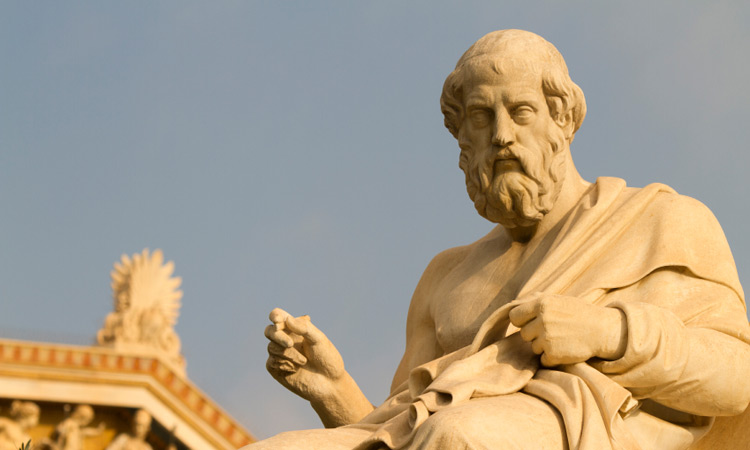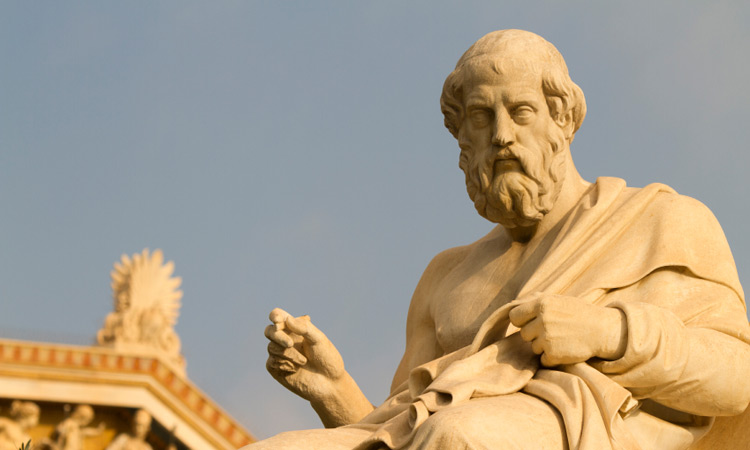 Imagine a group of shackled prisoners who’ve always lived under the earth in a cave like place. They can only see straight ahead to a wall. Behind them is a fire and, behind that, a low wall on top of which statues are manipulated, like puppets, by people hidden behind the wall. The prisoners see the projected shadows on the wall before them and believe them to be realer than real.
Imagine a group of shackled prisoners who’ve always lived under the earth in a cave like place. They can only see straight ahead to a wall. Behind them is a fire and, behind that, a low wall on top of which statues are manipulated, like puppets, by people hidden behind the wall. The prisoners see the projected shadows on the wall before them and believe them to be realer than real.
But then a prisoner breaks free and sees the fire, and the statues as more real than the shadows he’d taken for reality! Leaving the cave, at first dazzled by the brightness, he sees real trees and flowers, and realizes the statues were imitations—misattributions of reality.
His eyes now fully adjusted, he looks at the sun and understands it’s the cause of the light, his ability to see the objects.
The freed prisoner excitedly goes back down and explains to everyone that they’re all trapped in a cave, and that everything they think is real is an illusion, but they choose to remain where they are, in the dark.
The allegory of the cave is from the Republic by Plato, the classical Greek philosopher (circa 428-347 BC). If Plato were to look at our society today, our recent financial and ecological crises, would he think that we, too, are living in caves of delusion? Melissa Lane, professor of politics at Princeton University, shines a light on modern times and ancient Greek thought, particularly Plato’s, in Eco-Republic: What the Ancients Can Teach Us about Ethics, Virtue, and Sustainable Living.
A diseased city and soul—what, ours?
Plato’s Republic, Lane notes, “is a diagnosis of the ways in which city and soul were diseased in Greek societies, locked in some form of pathological embrace in which the dominant group imposed irrational goals on the society as a whole, and which the satisfactions sought by the ambitious and competitive were consistently unsatisfying, leading to further degeneration as their children sought satisfaction elsewhere.”
Indeed, some of the worst vices known to the ancient Greeks, Lane writes, are “hubris, or insolent arrogance towards one’s fellows and towards the divine; greed, or rapacious and unlimited desires; heedlessness, the refusal to brook restraint, which the ancients would call intemperance; and stupidity, which in this case means not intellectual incapacity, but an inability to understand real consequences and to appreciate true value.”
Sound familiar? Fast forward to the modern world, to see those vices carried out in fairly recent financial crises: “…the excessive greed of a few was merely the exaggeration of a system made broadly in their image: a system which was setup to allow people to push the limits for the purpose of material accumulation without any requirement to consider the bigger picture,” Lane says.
Pleonexia, or overreaching greed, was something the Greeks thought could threaten civic order. And while our modern-day crises caused chaos and destruction, Lane notes, economic and political systems did not fundamentally change, but instead remained mired in a state of inertia.
Inertia
Solutions, large and small, aimed at helping the environmental crisis, have sludged along. Lane notes a fairly recent backlash by some in the West over the redesigning or even abolishing the standard 100 watt incandescent bulb in favor of higher efficiency bulb. And in the East, India’s plastic bags “litter the landscape, clog drains and harm the cattle which eat them.”
So what’s the problem, she asks, “Why shouldn’t our supposed rational interest in saving money make it easy for us to change our lightbulbs or (facing even a small fine) stop using thin plastic bags?” It’s because “our social imagination, our social mythology, frames this as a breach of normality. It is normal to have ‘ordinary’ lightbulbs, normal to be given plastic bags, therefore being asked or required to change these habits is unreasonable, and this sense of a violation of expectations actually trumps the urge to save money.”
Plato would perhaps wag his finger at us, noting our lack of imagination and initiative, and argue for virtuous individual action over self-interest as a jumpstart to social change.
Imagination and initiative
Plato aims to light the imagination of his readers to see themselves, or their souls, if good and virtuous, as integral to an effective and healthy society. But can individual action lead to widespread change? Lane says “some individuals can decide to challenge existing norms, either out of personal conviction or position, or responding to changing circumstances or knowledge, and these initial challenges can sometimes engender a ‘bandwagon’ for change.”
A new vision
Will we ultimately meet the challenges of eco-concerns? Plato might say only with citizens who possess the virtues and values that will foster it. Lane agrees, “If ancient models of politics were largely abandoned for some good reasons in the transition to commercial society and capitalist economics, we now…have newly salient reasons to adopt aspects of ancient ethics once again.”
To find out about Rose’s thoughts on how to live a happier life, click here




2 Comments
mp3juice
Having read this I believed it was very enlightening.
I appreciate you finding the time and energy to put this information together.
I once again find myself personally spending a significant amount of time both reading and leaving comments.
But so what, it was still worth it!
Kyle Schlapkohl
Thank you so much, we’re so glad you enjoy the articles